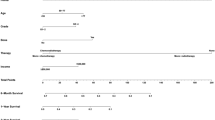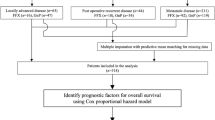Abstract
Purpose
To identify clinical and biologic variables with significant impact on survival in patients with carcinomas of an unknown primary site (CUP) and to develop a simple prognostic model.
Patients and methods
In this retrospective study, univariate and multivariate prognostic factors analyses were conducted in a population of 100 patients with CUP. Patients with features requiring well defined treatments had previously been excluded.
Results
Overall survival (OS) was significantly related to the following pretreatment adverse prognostic clinical factors: a poor performance status (2 or 3), weight loss more than 10% in the last six months, the presence of liver metastases and more than two metastatic sites. Two biological parameters predicted a significantly shorter survival: elevated serum levels of alkaline phosphatase and of lactate dehydrogenase. In the multivariate analysis, only two independent adverse prognostic parameters were retained: a poor performance status and the presence of liver metastases. We developed a prognostic model for OS based on the following subgroups: good prognosis (PS 0 or 1 and absence of liver metastases), intermediate prognosis (PS≥2 or presence of liver metastases) and poor prognosis (PS≥2 or presence of liver metastases). Median OS for the three groups was 10.8, 4 and 1.9 months respectively, p<0.0001.
Conclusion
A simple prognostic model using performance status and presence of liver metastases was developed. It allowed the assignment of patients into three subgroups with different outcomes. Treatment strategies could be adapted for each subgroup. We think that this prognostic model could be useful and should be validated in other patient series.
Similar content being viewed by others
References
Muir C (1995) Cancer of unknown primary site. Cancer 75:353
Pavlidis N, Briasoulis E, Hainsworth J et al (2003) Diagnostic and therapeutic management of cancer of an unknown primary. Eur J Cancer 39:1990
Hainsworth JD, Greco FA (1993) Treatment of patients with cancer of an unknown primary site. N Engl J Med 329:257–263
Sporn JR, Greenberg BR (1993) Empirical chemotherapy for adenocarcinoma of unknown primary site. Semin Oncol 20:261–267
Kaplan EL, Meier P (1958) Nonparametric estimation from incomplete observations. J Am Stat Assoc 53:457–481
Mantel N (1966) Evaluation of survival data and two new rank order statistics arising in its consideration. Cancer Chemother Rep 50:163–167
Daugaard G (1994) Unknown primary tumours. Cancer Treat Rev 20:119–147
Kambhu SA, Kelsen DP, Fiore J et al (1990) Metastatic adenocarcinomas of unknown primary site: prognostic variables and treatment results. Am J Clin Oncol 13:55–60
Hainsworth JD, Johnson DH, Greco FA (1992) Cisplatin-based combination chemotherapy in the treatment of poorly differentiated carcinoma and poorly differentiated adenocarcinoma of unknown primary site: results of a 12-year experience. J Clin Oncol 10:912–922
Abbruzzese JL, Abbruzzese MC, Hess KR et al (1994) Unknown primary carcinoma: natural history and prognostic factors in 657 patients. J Clin Oncol 12:1272–1280
Van der Gaast A, Verweij J, Planting AST et al (1995) Simple prognostic model to predict survival in patients with undifferentiated carcinoma of unknown primary site. J Clin Oncol 13:1720–1725
Culine S, Kramar A, Saghatchian M et al (2002) Development of a prognostic model to predict the length of survival inpatients with carcinomas of an unknown primary site. J Clin Oncol 20:4679–4683
Hess KR, Abbruzzese MC, Lenzi R et al (1999) Classification and regression tree analysis of 1000 consecutive patients with unknown primary carcinoma. Clin Cancer Res 5:3403–3410
Culine S, Fabbro M, Ychou Y et al (1999) Chemotherapy in carcinomas of unknown primary site: A high-dose intensity police. Ann Oncol 10:569–575
Culine S, Fabbro M, Ychou Y et al (2002) Alternatively bimonthly cycles of doxorubicin, cyclophosphamide, and etoposide, cisplatin with hematopoietic growth factor support in patients with carcinoma of unknown primary site. Cancer 94:840–846
Saghatchian M, Fizazi K, Borel C et al (2001) carcinoma of unknown primary site: A chemotherapy strategy based on histological differentiation — results of a prospective study. Ann Oncol 12:535–540
Lortholary A, Culine S, Bouzy J et al (2002) Cisplatin in combination with either gemcitabine or irinotecan in carcinomas of an unknown primary (CUP): results of a randomized phase II study. Proc Am Soc Clin Oncol 21:153a (abstr 609)
Palmeri S, Lorusso V, Palmeri L et al; Carcinomas of Unknown Primary Italian Study Group (2006) Cisplatin and gemcitabine with either vinorelbine or paclitaxel in the treatment of carcinomas of unknown primary site: results of an Italian multicenter, randomized, phase II study. Cancer 107:2898–2905
Hainsworth JD, Spigel DR, Litchy S, Greco FA (2006) Phase II trial of paclitaxel, carboplatin, and etoposide in advanced poorly differentiated neuroendocrine carcinoma: a Minnie Pearl Cancer Research Network Study. J Clin Oncol 24:3548–3554
El-Rayes BF, Shields AF, Zalupski M et al (2005) A phase II study of carboplatin and paclitaxel in adenocarcinoma of unknown primary. Am J Clin Oncol 28:152–156
Greco FA, Erland JB, Morrissey LH et al (2000) Carcinoma of unknown primary site: phase II trials with docetaxel plus cisplatin or carboplatin. Ann Oncol 11:211–215
Rebattu P, Quantin X, Ardiet C et al (2001) Dose-finding, pharmacokinetic and phase II study of docetaxel in combination with gemcitabine in patients with inoperable non-small cell lung cancer. Lung Cancer 33:277–287
Stathopoulus GP, Mavroudis D, Tsavaris N et al (2001) Treatment of pancreatic cancer with a combination of docetaxel, gemcitabine and granulocyte colony-stimulating factor: a phase II study of the Greek Cooperative Group for pancreatic cancer. Ann Oncol 12:101–103
Alberts SR, Townley PM, Goldberg RM et al (2002) Gemcitabine and oxaliplatin for patients with advanced or metastatic pancreatic cancer: a North Central Cancer Treatment Group Phase I Study. Ann Oncol 13:553–557
Faivre S, Le Chevalier T, Monnerat C et al (2002) Phase I–II and pharmacokinetic study of gemcitabine combined with oxaliplatin in patients with advanced non-small-cell lung cancer and ovarian carcinoma. Ann Oncol 13:1479–1489
André T, Tournigand C, Rosmordue O et al (2004) Gemcitabine combined with oxaliplatin (GEMOX) in advanced biliary tract adenocarcinoma (ABTA): a GERCOR study. Ann Oncol 15:1339–1343
Motzer RJ, Rodriguez E, Reuter VE et al (1995) Molecular and cytogenic studies in the diagnosis of patients with midline carcinomas of unknown primary site. J Clin Oncol 13:274
Ramaswamy S, Golub TR (2002) DNA microarrays in clinical oncology. J Clin Oncol 20:1932
Author information
Authors and Affiliations
Corresponding author
Rights and permissions
About this article
Cite this article
Ponce Lorenzo, J., Segura Huerta, A., Díaz Beveridge, R. et al. Carcinoma of unknown primary site: development in a single institution of a prognostic model based on clinical and serum variables. Clin Transl Oncol 9, 452–458 (2007). https://doi.org/10.1007/s12094-007-0084-6
Received:
Accepted:
Published:
Issue Date:
DOI: https://doi.org/10.1007/s12094-007-0084-6




